Description
| Item | S5320-28P-SI-DC | |
| Fixed port | 24 Ethernet 10/100/1000 ports,4 of which are dual-purpose 10/100/1000 or SFP, 4 GE SFP | |
| Extended slot | 2 | |
| Forwarding performance | 42 Mpps | |
| Switching capacity | 336Gbps | |
| VLAN | 4K VLANs | |
| Guest VLAN and voice VLAN | ||
| GVRP | ||
| MUX VLAN | ||
| VLAN assignment based on MAC addresses, protocols, IP subnets, policies, and ports | ||
| 1:1 and N:1 VLAN mapping | ||
| VLAN-based transparent transmission of protocol packets | ||
| Jumbo frame | 12K | |
| Ring protection | RRPP ring topology and RRPP multi-instance | |
| Smart Link tree topology and Smart Link multi-instance, providing millisecond-level protection switchover | ||
| Smart Ethernet Protection (SEP), G.8032 Ethernet Ring Protection Switching (ERPS) | ||
| STP (IEEE 802.1d), RSTP (IEEE 802.1w), and MSTP (IEEE 802.1s) | ||
| BPDU protection, root protection, and loop protection; BPDU tunnel | ||
| MPLS | MPLS L3VPN, MPLS L2VPN(VPWS/VPLS), MPLS-TE, MPLS QOS | |
| IP routing | Static routing, RIPv1/2, RIPng, OSPF, OSPFv3, IS-IS, IS-ISv6, BGP, BGP4+, ECMP, and policy-based routing |
|
| IPv6 features | Neighbor Discovery (ND) | |
| Path maximum transmission unit (PMTU) | ||
| IPv6 Ping, IPv6 Tracert, and IPv6 Telnet | ||
| 6 to4 tunnel, ISATAP tunnel, and manually configured tunnel | ||
| ACLs based on source IPv6 addresses, destination IPv6 addresses, Layer 4 ports, or protocol types | ||
| Multicast Listener Discovery (MLD) v1/v2 snooping | ||
| Multicast forwarding | IGMP v1/v2/v3 snooping and IGMP fast leave | |
| Multicast forwarding in a VLAN and multicast replication between VLANs | ||
| Multicast load splitting among trunk member ports | ||
| Controllable multicast | ||
| Layer 2 multicast control | ||
| Port-based multicast traffic statistics collection | ||
| IGMPv1/v2/v3, Protocol Independent Multicast Sparse Mode (PIM-SM), and Protocol Independent | ||
| Multicast Dense Mode (PIM-DM), and Protocol Independent Multicast Source-Specific Multicast (PIM-SSM) | ||
| Multicast Source Discovery Protocol (MSDP) | ||
| QoS/ACL | Inbound and outbound traffic rate limiting on a port | |
| Packet redirection | ||
| Broadcast storm control | ||
| Port-based traffic policing and two-rate and three-color CAR | ||
| Eight queues per port, Weighted round robin (WRR), deficit round robin (DRR), strict priority (SP), WRR+SP, and DRR+SP queue scheduling algorithms | ||
| Weighted random early detection (WRED) | ||
| Re-marking of the 802.1p priority and DSCP value of packets | ||
| Packet filtering based on Layer 2 to Layer 4 information, including source MAC addresses, destination MAC addresses, source IP addresses, destination IP addresses, TCP/UCD source/destination ports, protocol types, and VLAN IDs | ||
| Per queue rate limiting and interface traffic shaping | ||
| 1:1, N:1, N:4 port mirroring; VLAN mirroring | ||
| Security features |
Hierarchical user management and password protection | |
| DoS attack defense, ARP attack defense, and ICMP attack defense | ||
| Binding of the IP address, MAC address, interface number, and VLAN ID of a user | ||
| Port isolation, port security, and sticky MAC | ||
| MAC Forced Forwarding (MFF) | ||
| Blackhole MAC address entries | ||
| Limit on the number of learned MAC addresses | ||
| IEEE 802.1x authentication and the limit on the number of users on an interface | ||
| AAA authentication, RADIUS authentication, HWTACACS+ authentication, and NAC SSH v2.0 | ||
| Hypertext Transfer Protocol Secure (HTTPS) | ||
| CPU defense; Blacklist and whitelist | ||
| Access security | DHCP Relay, DHCP Server, DHCP Snooping, DHCP Client, DHCP Security | |
| Port aggregation | LACP | |
| Up to 64 trunk groups | ||
| Up to 8 member interfaces in each trunk group | ||
| Reliability | Ethernet OAM (IEEE 802.3ah and 802.1ag) | |
| ITU-Y.1731; BFD for BGP/IS-IS/OSPF/static route | ||
| Management and Maintenance |
iStack, Virtual cable test, SNMP v1/v2c/v3, RMON/RMON2 | |
| Web-based network management system | ||
| System logs and multi-level alarms | ||
| sFlow, LLDP/LLDP-MED | ||
| SCP (Secure Copy Protocol), TFTP, FTP | ||
| Store dual software images and configuration files | ||
| 802.3az Energy Efficient Ethernet (EEE) | ||
| Operating environment | Operating temperature: 0-1800 m altitude: 0-45℃ 1800-5000m altitude: The operating temperature reduces by 1℃ every time the altitude increases by 220m. Relative humidity: 5% to 95% (noncondensing) |
|
| Input voltage |
|
|
| Dimensions (mm) | 442 (W) x 420 (D)x 44.4 (H) | |
| Front power input | Yes | |
| Typical power consumption |
<21.2W |


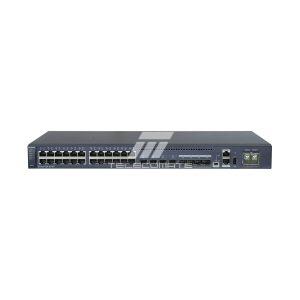
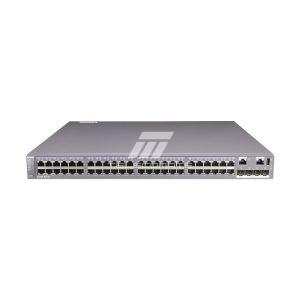
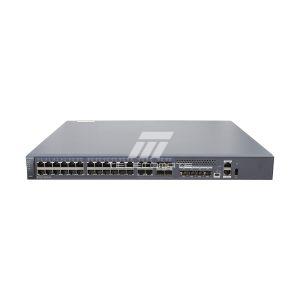
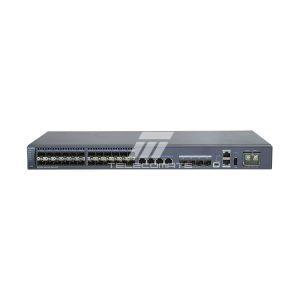
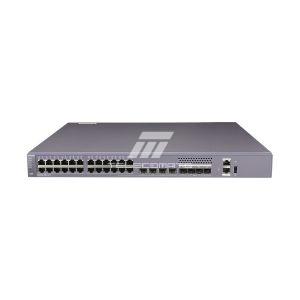
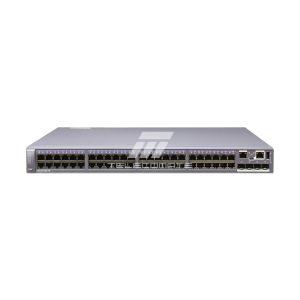
Reviews
There are no reviews yet.